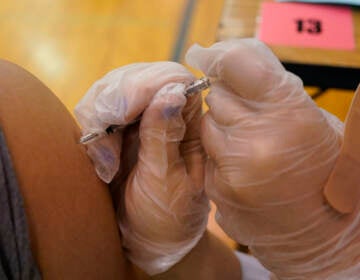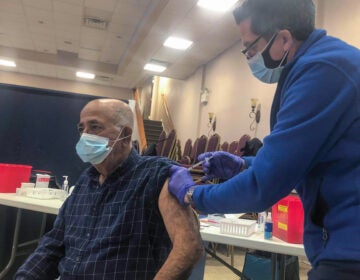Why men won’t go to the doctor, and how women coax them
Listen 10:13
(Illustration by Tony Auth)
It’s a perpetual battleground in the war between the sexes. Elisabeth Perez-Luna brings back dispatches from the frontlines.
I’ve always been puzzled about why the men in my family — father, brother, husband, each different in many ways — have one thing in common:
They refuse, just absolutely refuse, to go to a doctor.
Even when they feel lousy, persistently at times, they brush it off with an “I’m fine.” Then they head to the drug store to get an over-the-counter “something” to take care of whatever ails them.
I know the women in my family spend an inordinate amount of time trying to figure out how to get the guys to a checkup. In this, we join other wives, sisters, mothers the world over.
I chatted about this problem with some of my book club buddies. To protect the guilty (in other words, their husbands) we agreed I wouldn’t name names. After all, this is about caring, not blaming.
One of my friends remembers when she saw something different on her husband’s face:
“And I was worried about skin cancer and I would point it out to him and he would say, ‘Don’t worry about it, look at the other side of my face, you don’t have to look at it.’ Eventually, after I pointed it out to him every morning, he finally went to the doctor.”
Another said about her husband: “He doesn’t easily go to the doctor. He says he’s too busy. Hopes that the problem will go away. I try to make his appointments and he says. ‘I’ll check my calendar.’ It’s somewhat of a struggle.
A common experience? Talking, cajoling, threatening, leaving brochures in strategic places around the house? All tactics commonly used — and mostly ignored.
The book club’s conclusion?
“I find that using logic is probably not the best way to get to my husband.”
Excuses ‘R’ Us
So what is it with men and doctors?
It’s not a lack of information.
Popular web sites ranging from mancave.com to askmen.com give solid health advice and try to point men to the doctor’s office. WebMD has a good list of the most basic, vital things to take care of.
One site, aimed at digital natives younger than 40, lists the lamest common excuses for avoiding a checkup. Some choice ones:
“I don’t like to be touched by a doctor.”
“I’ll tough it out.”
“I don’t trust any doctors.”
The site MedicalExpress.com also has some good information on why men duck the doctor.
For the over-40 generation, some rather aggressive ad campaigns try to get men to listen and get tested. In a TV public service announcement, a woman Realtor congratulates a family for their new home — “You’ll have many happy years here.” — and then looks directly at the man, saying :
“Except for you, because you’ll be gone in three years from now, struck down by the same disease that got your father. Sadly it could have been detected early with a simple test, but you didn’t have it”
Direct enough? All these efforts send the same message in more or less elegant ways: Get off your butts and do something about. You might not be fine, you can’t always tough it out and, if you have time to track your fantasy football team, you’ve got time to do the doctor thing.
Why do so many men ignore such obvious truths?
Well, there are a few reasons for that, says Dr. Michael Kochman at the Hospital of the University of Pennsylvania’s division of gastorenterolgy.
The main one?
“Men are invincible.” Kochman said. “We are the men of the house and many hold that to be the truth because they’re busy and it’s a sign of weakness to go to a physician, even when one is feeling well.”
Chiropractor Basil Snyman of Center City agrees. He sees a lot of men waiting to drag themselves to his office until they’re in excruciating pain for weeks and months.
“Most men don’t get to the doc unless they’re in trouble,” he said. “Women are used to going to the gynecologist to get checkups and the gynecologist becomes their primary physician. What motivates men is pain and being able to do what they want to. If you can get them to have their cake and eat it, too, with minimal change in their lifestyle, they’re in.
Well, maybe so. But it gets really complicated when you consider the intricacies of defining masculinity. Men are supposed to be strong, tough, resilient, hard workers, good providers, good lovers, partners, husbands, parents … and bosses.
Exactly, says Dr. Kochman:
“I think they’re not wanting to appear weak or ill, especially for people who have either public jobs or hold important jobs at businesses. They don’t want to have any appearance of ever being sick, and that’s difficult.”
Older, wiser and paying attention
At Cardiac Rehab Center at Lankenau Hospital Heart Institute on the Main Line, you can meet a number of men who found out the hard way that they were not invincible, that wanting never to appear weak can in the end lay you low.
Under the supervision of physicians and specially trained nurses, these men come together at Lankenau several times a week to relearn how to live. Each has gone through cardiac surgery. Their ages range from 55 to 80 plus.
They agreed to share some of their stories with me, usually punctuated with some regret at not having listened to their spouses.
One said: ” My first heart attack had me quit smoking, my second heart attack had me lose 10 pounds. If you ask my wife, that was a definite concern of hers and I have to keep my weight down.”
I asked what they missed the most about their lives pre-heart attack: Among the responses:
Meat.
Salt.
Cheese.
Dessert.
After admitting how much he loved pastries, one program participant said, “I just had to put it all out of my diet. You have to resolve yourself if you want to live longer”.
Then the youngest in the group, 55-year-old Scott Snyder, talked about how the constant pressures of work had affected his health.
“With cell phones and wifi, you are connected 24/7,” he said. “To be honest with you, as I was rethinking it through, the greatest regret is not setting boundaries, that this is work and this is my life and this is my health. That’s difficult. We all want to succeed professionally. Many of us work very hard and it’s very difficult to say, ‘You know what? I’m going home. I’ll deal with it in the morning.’ That’s tough. It’s been easier since my heart attack, but that’s tough”.
The men at Lankenau said one of the benefits of the program there is it gives them a chance to talk with other men who are gong through similar things. They encourage each other to take care of themselves, not to always wait for the women in their lives to pressure them.
‘Curbside’ service
But it never gets easy to take that plunge, even for physicians, says Dr. Jay Siegfried, director of Lankenau’s Cardiac Rehab Center.
“There’s a game that played in every single corridor in every hospital,” Siegfried said. “It goes like this: You sidle up to your colleague, who happens to be your friend, who probably shares many fears, and shares medical knowledge in areas that you might not. And you say, ‘May I curbside you?’ Then you ask the question that’s bothering you or your wife has been hounding you about and you decide if you want to pursue it any longer. It’s cheating a little bit, because you don’t have to make a full commitment to see the doctor. You don’t have to admit that you are sick. You can almost say, ‘I have a friend who has this.'”
So are there any signs of hope for the women in my book club?
Yes, says Kochman, but changes in the health prevention field take time. They go hand in hand with a host of other issues, ranging from attitudes to access to affordable health care to strong public awareness campaigns. But the combined force of such things can change behaviors, he says:
“Tobacco cessation is a good example of something that no one would listen to for a while and now it’s clearly one of the aims of primary internists.”.
The media are also offering men more honest talk about diet, exercise and longevity in formats they can handle. Celebrities play a big role here. Think of Katie Couric’s impact when she spoke openly about her husband’s dying of colon cancer, and underwent a colonoscopy on national TV.
It’s on the individual
But the reality is, even if men become more receptive to messages about prevention, women are a long way from shedding their frequent role as the family’s primary sentries and gatekeepers for health care.
In the long run, says Kochman, the HUP doctor, the trend in medical care is going to be increased personal responsibility— for both men and women.
“The idea that doctors have to tell you what to do, that has to change,” he said. “It has to be more of a ‘I have an understanding of what’s best for me, I have to act responsibility.’ Now, how you get to that level of cooperation and compliance is a difficult one to answer. I’m not sure how you get there, but the buck stops in the individual.”
Yes, indeed.
As I found out in my research for this essay, it’s easier to set that as a goal than live up to it day after day.
New Year’s resolution anyone?
WHYY is your source for fact-based, in-depth journalism and information. As a nonprofit organization, we rely on financial support from readers like you. Please give today.






